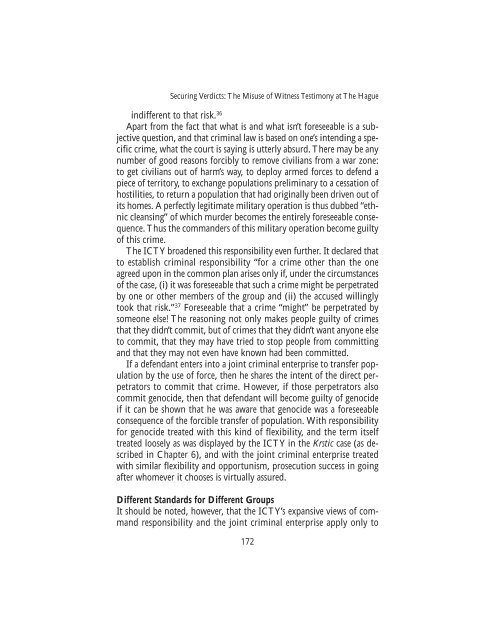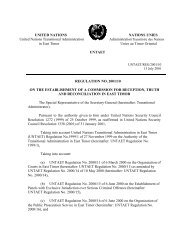The Srebrenica Massacre - Nova Srpska Politicka Misao
The Srebrenica Massacre - Nova Srpska Politicka Misao
The Srebrenica Massacre - Nova Srpska Politicka Misao
Create successful ePaper yourself
Turn your PDF publications into a flip-book with our unique Google optimized e-Paper software.
Securing Verdicts: <strong>The</strong> Misuse of Witness Testimony at <strong>The</strong> Hague<br />
indifferent to that risk. 36<br />
Apart from the fact that what is and what isn’t foreseeable is a subjective<br />
question, and that criminal law is based on one’s intending a specific<br />
crime, what the court is saying is utterly absurd. <strong>The</strong>re may be any<br />
number of good reasons forcibly to remove civilians from a war zone:<br />
to get civilians out of harm’s way, to deploy armed forces to defend a<br />
piece of territory, to exchange populations preliminary to a cessation of<br />
hostilities, to return a population that had originally been driven out of<br />
its homes. A perfectly legitimate military operation is thus dubbed “ethnic<br />
cleansing” of which murder becomes the entirely foreseeable consequence.<br />
Thus the commanders of this military operation become guilty<br />
of this crime.<br />
<strong>The</strong> ICTY broadened this responsibility even further. It declared that<br />
to establish criminal responsibility “for a crime other than the one<br />
agreed upon in the common plan arises only if, under the circumstances<br />
of the case, (i) it was foreseeable that such a crime might be perpetrated<br />
by one or other members of the group and (ii) the accused willingly<br />
took that risk.” 37 Foreseeable that a crime “might” be perpetrated by<br />
someone else! <strong>The</strong> reasoning not only makes people guilty of crimes<br />
that they didn’t commit, but of crimes that they didn’t want anyone else<br />
to commit, that they may have tried to stop people from committing<br />
and that they may not even have known had been committed.<br />
If a defendant enters into a joint criminal enterprise to transfer population<br />
by the use of force, then he shares the intent of the direct perpetrators<br />
to commit that crime. However, if those perpetrators also<br />
commit genocide, then that defendant will become guilty of genocide<br />
if it can be shown that he was aware that genocide was a foreseeable<br />
consequence of the forcible transfer of population. With responsibility<br />
for genocide treated with this kind of flexibility, and the term itself<br />
treated loosely as was displayed by the ICTY in the Krstic case (as described<br />
in Chapter 6), and with the joint criminal enterprise treated<br />
with similar flexibility and opportunism, prosecution success in going<br />
after whomever it chooses is virtually assured.<br />
Different Standards for Different Groups<br />
It should be noted, however, that the ICTY’s expansive views of command<br />
responsibility and the joint criminal enterprise apply only to<br />
172



